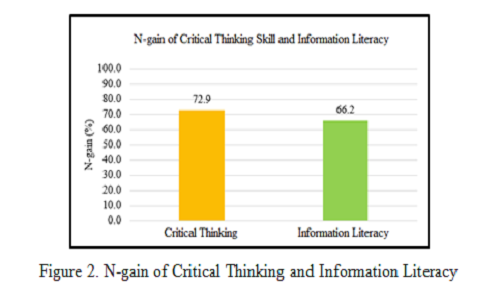
Correlation Between Information Literacy and Critical Thinking Enhancement Through PjBL-Information Literacy Learning Model
Abstract
Information literacy is closely related to critical thinking skills. Critical thinking skills are related to exploring and evaluating information to make argumentation with relevant and appropriate information. It includes analyzing and synthesizing information to solve a problem where these activities are part of information literacy. Thus, information literacy-based learning should be able to enhance critical thinking skills. This study aims to determine the correlation between critical thinking skills and student’s information literacy enhancement through learning chemistry with the PjBL-IL model on the biogas production context. This study used a pre-experimental method - one group pretest-posttest design involving 32 high school students. Students' critical thinking and information literacy skills were measured using tests. Critical thinking skills and information literacy enhancement on high and medium category with N-gain score are 72.90% and 66.20% respectively and show a low correlation with a correlation coefficient value of 0.144. Where the basic support indicator has a negative correlation (r = -0.105). Thus, critical thinking skills enhancement is not always in line with information literacy.
Keywords
Full Text:
PDFReferences
Afdareza, M. Y., Yuanita, P., & Maimunah, M. (2020). Development of learning device based on 21st century skill with implementation of problem-based learning to increase critical thinking skill of students on polyhedron for grade 8th junior high school. Journal of Educational Sciences, 4(2), 273-284.
Aharony, N., & Gazit, T. (2020). Students’ information literacy self-efficacy: an exploratory study. Journal of Librarianship and Information Science, 52(1), 224-236.
American Library Association (ALA). (2000). Information Literacy Competency Standards for Higher Education. Chicago: ALA.
Bergsma, W & Croon, M. (2009). Marginal Models: For Dependent, Clustered, and Longitudinal Categorical Data. London: Springer Science+Business Media.
Crist, C. A., Duncan, S. E., & Bianchi, L. M. (2017). Incorporation of cross‐disciplinary teaching and a wiki research project to engage undergraduate students to develop information literacy, critical thinking, and communication skills. Journal of food science education, 16(3), 81-91.
De Paor, S., & Heravi, B. (2020). Information literacy and fake news: how the field of librarianship can help combat the epidemic of fake news. The Journal of Academic Librarianship, 46(5), 102218.
Dimmitt, N. (2017). The power of project-based learning: experiential education to develop critical thinking skills for university students. In CBU International Conference Proceedings. 5, 575-579.
Erwiza, E., Kartiko, S., & Gimin, G. (2019). Factors affecting the concentration of learning and critical thinking on student learning achievement in economic subject. Journal of Educational Sciences, 3(2), 205-215.
Ennis, R. H. (2011). The nature of critical thinking: An outline of critical thinking dispositions and abilities. University of Illinois, 2(4).
Goodsett, M. (2020). Best practices for teaching and assessing critical thinking in information literacy online learning objects. The Journal of Academic Librarianship, 46(5), 102163.
Grafstein, A. (2017). Information literacy and critical thinking: context and practice. In Pathways into information literacy and communities of practice. UK: Chandos Publishing.
Hake, R. R. (2002). Relationship of individual student normalized learning gains in mechanics with gender, high-school physics, and pretest scores on mathematics and spatial visualization. In Physics education research conference, 8(1), 1-14.
Herring, J.E. (2010). Improving students’ web use and information literacy. London: Facet Publisher
Leaning, M. (2019). An approach to digital literacy through the integration of media and information literacy. Media and Communication, 7(2), 4-13.
Ministry of Education. (2006). Project-Based Learning Handbook, Educating the Milennial Learner. Malaysia: Educational Technology Division (ETD).
Pemerintah Republik Indonesia. (2016). Silabus Mata Pelajaran Sekolah Menengah Atas/Madrasah Aliyah (SMA/MA): Kimia. Jakarta: Kementrian Pendidikan dan Kebudayaan.
Sasson, I., Yehuda, I., & Malkinson, N. (2018). Fostering the skills of critical thinking and question-posing in a project-based learning environment. Thinking Skills and Creativity, 29, 203-212.
Schober, P., Boer, C., & Schwarte, L. A. (2018). Correlation coefficients: appropriate use and interpretation. Anesthesia & Analgesia, 126(5), 1763-1768.
Seifi, L., Habibi, M., & Ayati, M. (2020). The effect of information literacy instruction on lifelong learning readiness. IFLA Journal, 0340035220931879.
Subekti, H., Taufiq, M., Susilo, H., Ibrohim, & Suwono, H. (2018). Mengembangkan literasi informasi melalui belajar berbasis kehidupan terintegrasi STEM untuk menyiapkan calon guru sains dalam menghadapi era revolusi industri 4.0: review literatur. Education and Human Development Journal, 3(1), 81–90.
Syafaren, A., Yustina, Y., Mahadi, I., & Vebrianto, R. (2019). Increasing critical thinking skills through natural science learning based on the integration of guided inquiry with numbered heads together. Journal of Educational Sciences, 3(3), 433-444.
Trisdiono, H., Siswandari, S., Suryani, N., & Joyoatmojo, S. (2019). Development of Multidisiplin Integrated Project-Based Learning Model to Improve Critical Thinking and Cooperation Skills. JPI (Jurnal Pendidikan Indonesia), 8(1), 9-20.
Weber, H., Hillmert, S., & Rott, K. J. (2018). Can digital information literacy among undergraduates be improved? evidence from an experimental study. Teaching in Higher Education, 23(8), 909-926.
Wenger, K. (2014). Problem-based learning and information literacy. PaL, Pennsylvania Libraries: Research & Practice, 2(2), 142 -154.
DOI: http://dx.doi.org/10.31258/jes.4.4.p.774-784
Refbacks
- There are currently no refbacks.
Copyright (c) 2020 Siti Supriyanti, Anna Permanasari, Fitri Khoerunnisa

This work is licensed under a Creative Commons Attribution 4.0 International License.
Publisher: FKIP Universitas Riau












